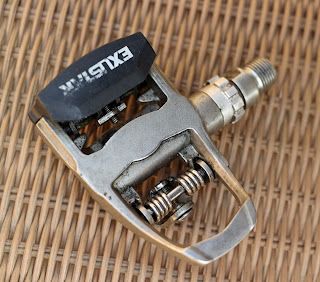So, the Holdsworth’s returned
hibernation due to torrential rains and semi-flooded roads. Gives me chance to
acquire a replacement Apeman housing. Talking bars, I reached my verdict on the
Velo Orange Handlebar Accessory Mount. https://www.sevendaycyclist.com/velo-orange-handlebar-accessory-mou
Defaulted to my fixed gear
winter/trainer, early season training kit, and wet lube. Mildly temperamental
cleat engagement promoted some introspection, and ultimately replacement of the
left. I’d had a part-worn spare (in much better shape) bouncing around a small
parts tin. Bolted in situ, harmony restored.
Patterns are generally very accurate.
Some will argue this is because many are made in the same factories, and simply
re-branded. Maybe so. However, having mixed n’ matched VP, Wellgo, XTC, Exustar,
(and pretty much every SPD pattern I could get my feet in, these past 25 years)
I’ve concluded Shimano cleats are machined to marginally tighter tolerances.
Placed aside each other, these
ISSI cleats have a ledge, whereas the Shimano are flat. Interestingly, the
Shimano engage and release faster than the dedicated ISSI (which, in fairness,
work harmoniously with the brands discussed).
As with cameras, there’s a
sound economic, and practical argument for running one, or two systems. I ran
Look on my road bikes, SPD on my mtbs for several years (rather like running wet
lubes during winter, dry during summer).
However, the latter system’s
convenience- the ability to walk, rather than hobble (and gouging expensive
flooring) through the house, or when navigating slippery surfaces etc, saw their
wholesale adoption. Holdsworth & Teenage Dream, run Time, SPD for Univega
and of course, fixed gear winter/trainer.
I prefer dual sided systems,
especially riding fixed, since you can simply clip in, and power away. However,
some single-sided designs, including these Wellgo are weighted, which means the
pedal “presents” the cleat mechanism, so less faff.
This; coupled with their
smaller surface area has proven a winning combo on my tubby tourer. I’ve also run a set of Time All Road Gripper
Pedals, to good effect. They were a hybrid design- cleat mechanism one side,
rubberised platform, on the other.
They’ve been gone from the
French marque’s range for several years, and pricey for working bikes, relative
to dual sided SPD patterns.
My only minor gripe, with Time’s otherwise
brilliant ATAC, is the use of brass cleats. The softer metal wears faster, and replacements
are expensive, relative to the ubiquitous SPD.
Stating the obvious perhaps,
but this soggy spell has been perfect, for testing wet lubes (although I also
like putting dry formulas against the elements. If only to see how they’ll cope
when an arid ride turns unexpectedly soggy).
Talking of which, despite looking slightly
thirsty, touching my fixed’s chain revealed a stoical black, lubricant layer. I’ve
since cruised past the 300-mile mark, before this became a faint, filmy state.
So, since I was adjusting the chain tension… Out came the Zefal Pro Dry Chain
Lube. An odd choice some would argue. Afterall, these are specifically designed
for tinderbox dry conditions.
However, the UK is, apparently on the cusp
of high pressure and blue skies. Is the Pro Dry going to be of the old school,
i.e. washed away come the first hint of drizzle? Only real-world miles will tell.
Several months in, I’m pleased to report
that the Velo21 Ultimate Paintwork Protection https://www.sevendaycyclist.com/velo-21
has lived up to its hype. In a nutshell, its compatible with matt, satin and
gloss finishes, a little goes a long way, and results are lasting.








